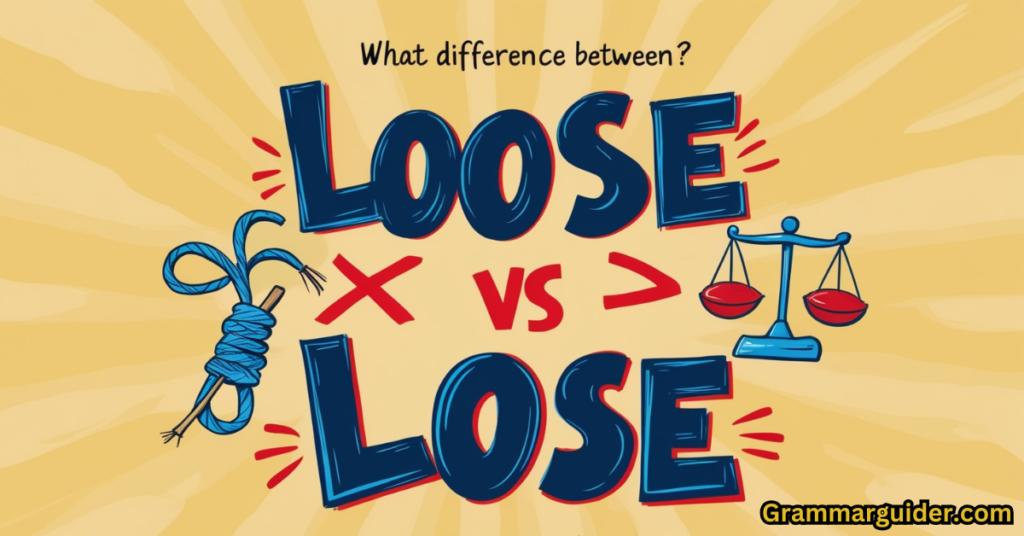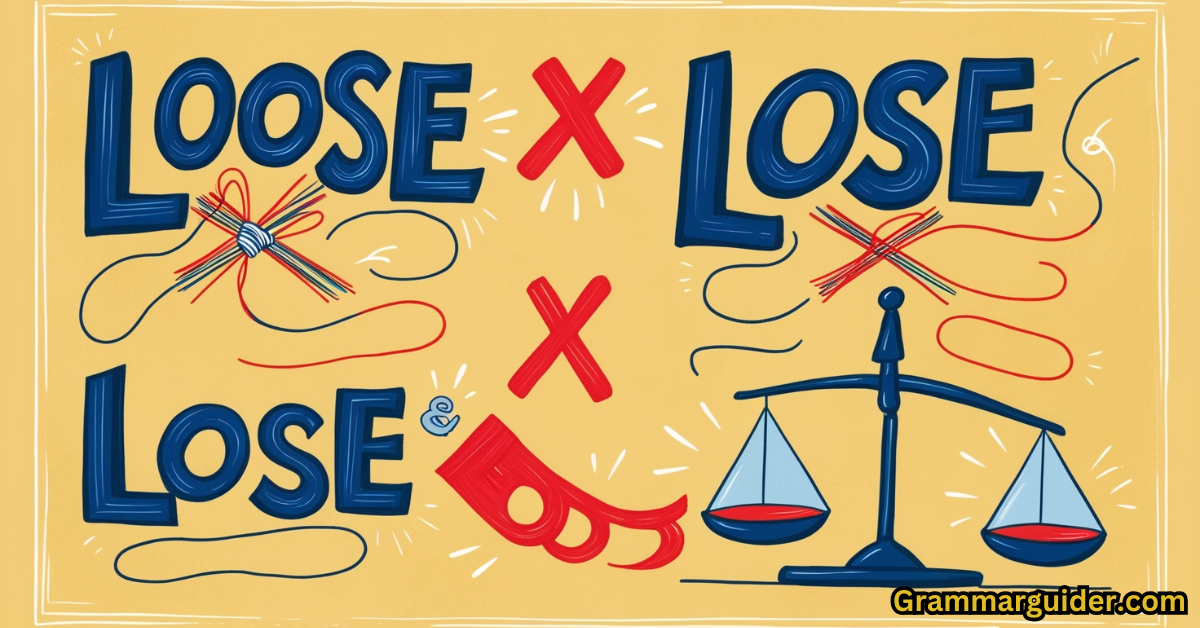The English language is filled with words that sound similar but have very different meanings and uses. One of the most commonly confused word pairs is “loose” vs lose. While these words may seem interchangeable at first glance, they each serve a distinct purpose in a sentence. Understanding the difference between loose and lose is key to mastering English vocabulary and ensuring your writing is both accurate and clear.
In this article, we’ll dive into the definitions and proper usage of these two words, explain why they often cause confusion, and provide grammar tips to help you avoid common mistakes. We’ll also look at the origins of these words and provide plenty of examples to help clarify their meanings.
What is the Difference Between Loose and Lose?
Let’s begin by defining these words clearly:
Loose Definition
Loose is an adjective, which means something is not tight or not firmly attached. It can refer to physical objects, like clothing or parts, as well as more abstract concepts, such as rules or interpretations.
Example: The loose chair wobbled every time I sat in it.
Lose Definition
On the other hand, lose is a verb, which refers to the action of no longer having something, either accidentally or through some form of failure. It can also describe the act of failing to win or attain something.
Example: I lost my keys again!
Why Do People Confuse Loose and Lose?
The main reason people confuse loose vs lose is because they sound similar when spoken aloud. While one is an adjective and the other a verb, they are often misheard or misused in writing. This can lead to frustrating mistakes that reduce the clarity and professionalism of your communication.
In this article, we’ll explore both words in more detail, including their pronunciations, word forms, and synonyms. We’ll also provide examples in context to help you understand when to use each word correctly. So let’s clear up this common word usage issue once and for all!

Loose: An Adjective with Many Uses
As mentioned, loose is an adjective. It describes something that is not tight, secure, or controlled. Below are some typical contexts where you might use loose:
Loose Clothes
When talking about clothing, loose means the garment does not fit tightly on the body.
Example:
Hi Sarah,
I noticed that your shirt looks a bit loose. I hope you didn’t accidentally grab the wrong size!
Loose Parts
Loose can also describe parts of something that are not tightly attached. For instance, you may refer to a loose screw, bolt, or button.
Example:
Hey Mark,
It seems like one of the loose screws on the back of the desk is making it wobble. Please fix that before it falls apart.
Loose Rules or Interpretations
Loose can also describe something that is not strictly enforced or interpreted. For example, rules can be loose if they are flexible or not rigidly followed.
Example:
Dear John,
The company has a loose policy on remote working, so feel free to adjust your schedule accordingly.
Synonyms for Loose
- Slack
- Baggy
- Free
Lose: A Verb with Several Meanings
On the other hand, lose is a verb. It’s used to indicate that you have misplaced something or failed to maintain possession of it. It also refers to failing to win something, such as a competition or contest.
Misplacing Something
When you lose an item, it means you no longer have it in your possession. It may have been lost accidentally or forgotten somewhere.
Example:
I can’t find my wallet. I think I lost it at the coffee shop earlier this morning.
Failing to Win
Lose is also commonly used when someone fails in a competition or contest.
Example:
Unfortunately, our team lost the match. We’ll have to train harder for the next one.
Losing Ground or Power
In a figurative sense, lose can also mean to fall behind or weaken in position.
Example:
The company started to lose ground after the new competitor entered the market.
Synonyms for Lose
- Misplace
- Forfeit
- Fail
- Loss
Grammar Rules for Loose and Lose
Understanding when to use loose or lose is essential for clear and correct writing. Here’s a quick rundown of the grammar rules for each word:
| Word | Part of Speech | Meaning | Examples |
|---|---|---|---|
| Loose | Adjective | Not tight or secure | Her pants are loose. |
| Lose | Verb | To fail to keep, find, or win | I lost my keys. |
Verb Forms of Lose
When it comes to the verb lose, its forms are:
- Base form: lose
- Past tense: lost
- Past participle: lost
- Present participle: losing
Example:
I am losing hope that I will find my phone, but I’ll keep looking.
Word Pronunciation Confusion
Both loose and lose share a similar pronunciation, which is why they are often mixed up. Loose rhymes with words like “goose” or “moose,” while lose rhymes with “choose” or “use.”
Despite the similar sounds, it’s important to remember that loose is an adjective, and lose is a verb. The context in which you use them will help clarify the meaning.
Word Origins: Tracing Loose and Lose Back in Time
Understanding the word origins of loose and lose can provide additional insight into their meanings.
- Loose comes from the Old French word “los” (meaning “free” or “unbound”) and is related to the Latin word “lassus” (meaning “weary” or “loose”).
- Lose derives from the Old English word “losian” (meaning “to perish” or “to be deprived”) and has roots in the Proto-Germanic “lausjan”.
These distinct word histories reveal how the two words, while sounding similar, have evolved to serve different grammatical purposes.
Examples in Context: When to Use Loose vs Lose
To make the difference even clearer, let’s look at how loose and lose might be used in real-life contexts. Below are a couple of scenarios where loose and lose are used correctly:
Email Example 1: Loose
Subject: Loose Connection Issues
Hi David,
I hope you’re doing well. I wanted to follow up on the call we had earlier today. I noticed that the connection was a bit loose, which caused some audio issues. Could we reschedule to make sure everything is working smoothly?
Best,
Anna
Email Example 2: Lose
Subject: Lose Access to Account
Hello Jessica,
I’m sorry to inform you that your account has been temporarily lost due to a system error. Please rest assured that we’re working on restoring access as quickly as possible. We’ll send you an update within the next 24 hours.
Sincerely,
Support Team
Avoiding Common Word Confusions
To steer clear of confusion between loose and lose, here are some tips:
- Loose describes something that is not tight, secure, or controlled (e.g., loose clothes, a loose screw).
- Lose is an action, referring to failing to retain or obtain something (e.g., lose a game, lose your keys).
- Always ask yourself: “Am I describing something or talking about an action?” If it’s an action, use lose. If you’re describing something’s state or condition, use loose.
Conclusion: Mastering the Difference Between Loose and Lose
In summary, while loose vs lose may seem tricky, understanding their definitions, uses, and grammatical roles can help you master this common word usage issue. Whether you’re writing an email or just chatting with friends, knowing when to use loose (adjective) and when to use lose (verb) will enhance the clarity of your communication.
By keeping the grammar rules and examples in context in mind, you’ll avoid this mistake and make your English sound more polished. And as you continue expanding your English vocabulary, you’ll gain confidence in choosing the right words for any situation.

Harley Rose is a seasoned expert in English grammar and writing tips, blending years of knowledge and a love for language into her work. With a sharp eye for detail and a talent for making grammar accessible, Harley shares practical insights that help readers write with precision and flair. Her content is ideal for anyone looking to strengthen their writing skills and express themselves with confidence.

